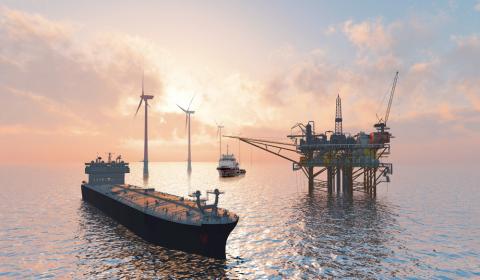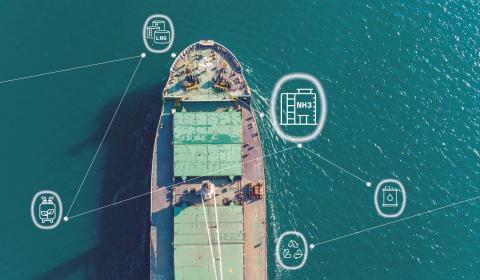
4 practical ways to decarbonize the offshore industry
At Business Green’s Net Zero Investment webinar for offshore oil and gas companies, a panel of experienced investors delivered a salient pronouncement. While the global investment portfolio for traditional oil and gas in 2021 still significantly outweighed that of alternative energies, investment in renewable sources is rising annually. The question for oil and gas companies is no longer if renewables will outpace oil, but when the tipping point will come.
Data like this—along with ever-changing market conditions, social expectations and financial pressures—are pushing oil and gas companies to adapt. Many major producers have recently made substantial investments in renewable energy and vowed to rework their carbon-heavy supply chains and production methods. But this is easier said than done, and oil and gas companies are now facing the practical implications of their investments and climate-conscious initiatives.
Four key areas for action
The first concern of any oil and gas company is to minimize the greenhouse gas emissions (GHG)—particularly carbon—from production operations. Oil won’t completely disappear, and it will remain a part of the future energy mix. Producers, however, are looking to green their production processes and generate “low-carbon barrels.” This requires analyzing the production chain, identifying areas for improvement, and implementing policies to reduce GHG output.
A second crucial front is the development of cleaner energies. Offshore oil and gas companies have taken the first steps to develop offshore wind farms, which can benefit from some of the same infrastructure as oil platforms. The electrification of assets will enable producers to remove carbon-heavy machinery, replacing them with connections to onshore operations and offshore wind farms that generate sustainably produced electricity. Among the renewable energy sources that companies are developing are green hydrogen, solar power, offshore wind and tidal energy.
A third pillar for many companies involves minimizing carbon emissions while undergoing the transition from carbon-heavy to decarbonized activities. The development of carbon capture and storage (CCS) technology is key to these efforts, enabling producers to capture significant amounts of the carbon produced by traditional activities. Looking even further ahead, CCS technology can help oil and gas companies remove carbon that has already escaped into the atmosphere, undoing past negative environmental impacts.
Finally, beyond changing internal production processes and developing sustainable forms of energy, oil and gas companies will need to broaden their vision to include the entire supply chain. Companies are increasingly being held accountable for suppliers’ impacts, and to achieve net zero emissions by 2050, suppliers will also need to limit emissions. While companies may first prioritize minimizing the carbon output of their own operations, they will need to integrate supply chain thinking into their long-term environmental management strategies.
A suite of services for decarbonization
In collaboration with our colleagues across Bureau Veritas’ global network, Bureau Veritas Marine & Offshore offers a full suite of decarbonization services. Our experts help offshore oil and gas companies build a complete carbon strategy. With a solid approach in place, our clients can quantify their impact, implement relevant standards and management systems, report on decarbonization efforts, and verify data.
Our technical solutions for GHG protocols and ESG criteria aid companies in monitoring and limiting their energy consumption and emissions. Bureau Veritas provides third party verification, design certification, Approval in Principle and technology qualification for new solutions for CCS, hydrogen and other alternative energies.
This helps de-risk and advance key projects, enabling clients to capitalize on Bureau Veritas’ already extensive experience in renewable and clean energies. We also offer third party verification of data, regulatory auditing, assurance and reporting, and consultancy for actors across the supply chain, including manufacturers, operators and distributers.
YOU MAY ALSO LIKE










